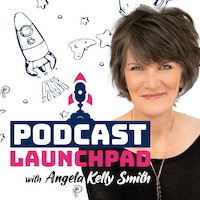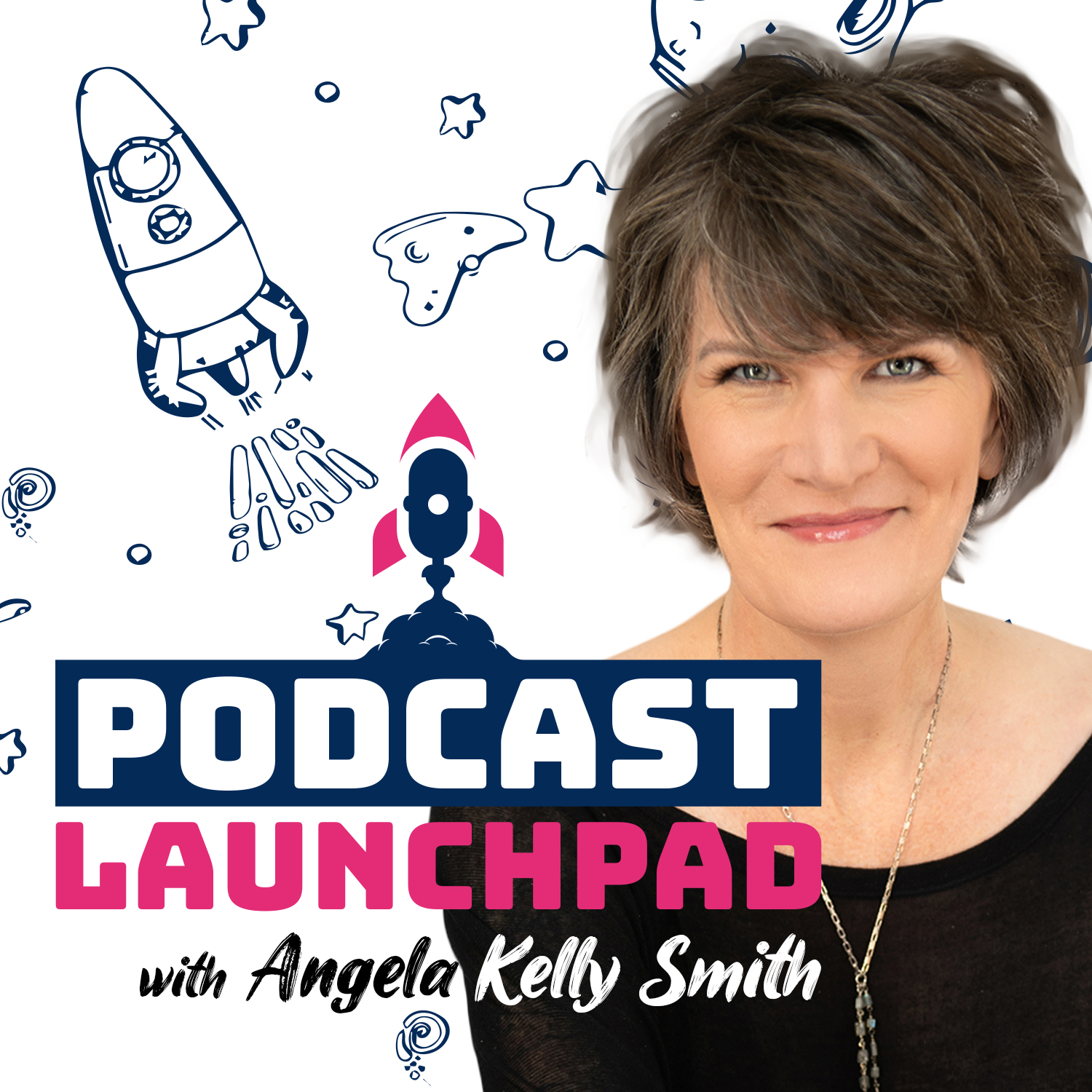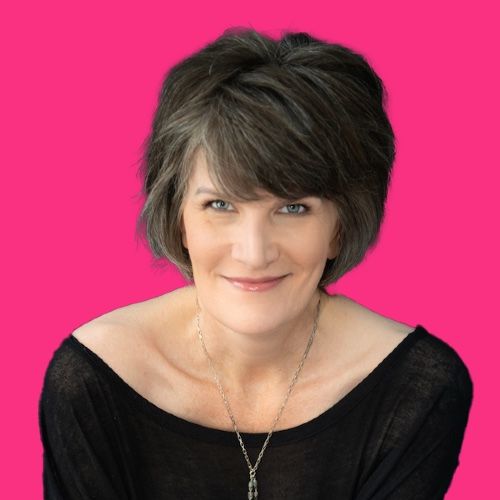105: How Imposter Syndrome is Limiting Your Podcast Success
Who am I to have my own podcast? Who would want to listen to what I have to say? Have you ever had these thoughts? Most podcasters have. And they can be stopping you from starting a podcast or from achieving greater success in your podcast.
Imposter thinking is so normal—especially amongst entrepreneurs and podcasters. We’re really putting ourselves out there in a big and public way. It makes sense that we’d sometimes feel like a “fraud.”
Even though it’s normal, it doesn’t mean you have to give into imposter thinking! This episode will help you change your thinking so you can have a more successful podcast.
In this episode, you’ll learn:
- Why experience is more important than countless certifications and degrees
- When comparison can actually help you out of imposter thinking and how to do it
- Why you should break the myth that “everyone has a podcast, and no one will want to listen to mine”
- Why you need a host avatar and how to create one
Related episodes:
13: How Do I Identify an Ideal Listener for My Podcast?
45: How to Set the Right Goals for Your Podcast
49: Tips for a Stress-Less Podcast with KonMari Consultant Caroline Thor
--
Transcript
Who am I to start my own podcast? Who would want to listen to what I have to say? Do I have anything to say that's worth listening to? Who do I think I am to share this information? Have you ever had these thoughts? Have they stopped you from starting a podcast or from going bigger in your current podcast?
Kelly [:That's what we're going to talk about today, imposter syndrome and limiting thoughts that keep you from starting a podcast or that hold you back from greater success in your current podcast.
Music [:Music
Kelly [:Welcome back to Podcast Launchpad. I'm Kelly. Y'all know that I've been a co-host at Geek Girl Soup for over 11 years. A couple of my buddies started Geek Girl Soup as a blog in 2011 as a way to make their voices public.
Kelly [:The tagline for Geek Girl Soup is Pop Culture from a Geek Girl's Perspective. My buddies are pretty shy, not extroverts at all.
Kelly [:They started the blog as a way to challenge themselves to be more out there with their voices and their opinions. Now, they quickly switched to podcasting since they loved chatting with each other about movies, tv shows, and books. And it was an even greater challenge for them to get their literal voices online in a public way.
Kelly [:Would anyone listen? Would anyone care about their opinions? They didn't know, and in their case, they didn't totally care since they weren't podcasting as a way to make money or to support a business. Now, I joined them a couple of months later. My first episode was talking about the video game, Skyrim.
Kelly [:Was I a real gamer? Was I an expert at Skyrim? Far from it. I played video games occasionally and then binged them whenever I was playing. And I just adore Skyrim. Who did we think we were to podcast about movies, TV shows, and the occasional video game? We weren't, and we aren't, trained critics. We hadn't watched all the things or played all the games.
Kelly [:In our case, we share our opinions on our show. We talk about movies and TV shows that we're watching, our favorite streaming services, and diversity, equity, and inclusion in the entertainment industry. We don't have to be experts or film historians or real film critics because our show is opinion based.
Kelly [:Now, in your case, and in the case of this show, we are sharing information that's meant to help our listeners solve some kind of problem, right? So we have to be quote experts to some degree. So, how expert do we have to be? Do you have to have a master's degree or a PhD or countless certifications in your field that some of you I know keep going for?
Kelly [:Because otherwise you really feel that imposter syndrome coming in, right? No. You don't have to have all the degrees and all the certifications. But you at least have to have deep personal experience in what you're sharing, and, in many cases, some formal training. A guest who's appearing on this show in a few months,
Kelly [:Jennifer Senn, experienced the loss of her twins at 36 weeks. She suffered through trauma, the, the trauma of that loss for 10 years before getting help from a coach. She had been seeing therapists, but it really took a coach to help her feel heal from that loss. And after healing, she then got coach training and is now a life and loss coach.
Kelly [:And then she started a podcast called Navigating Baby Loss. So she has direct experience and training to be able to help her clients and her listeners. Another guest on this show who was on a few months ago, Caroline Thor, went through Marie Marie Kondo's book, the Life-Changing Magic of Tidying Up. She transformed her life and her family life by working through the book on her own.
Kelly [:She was so inspired by the changes that she got that she trained as a KonMari consultant. So, she started her podcast Living Clutter Free Forever to help make it easier for listeners to implement the KonMari Method in their lives. So let's go back to that question of who am I to start my own podcast? I am not going to throw back at you that question of who are you not to start your own podcast
Kelly [:because the imposter brain will just find reasons to show you why you shouldn't have your own podcast. Right? When you ask your brain a question like that, any question, your brain is gonna start to answer it. So if you ask it, who am I not to start a podcast, it's gonna fill in the blank. So I don't want your brain to do that.
Kelly [:So sometimes comparison can be really helpful. Now, I do not want you to compare where you are right now in your podcasting journey or in your business journey to where other successful entrepreneurs and podcasters are right now. You know, like, if they have a massive audience and you don't yet, or they're making lots of money, or they seem to be making lots of money from their podcast, and you're not yet. What I want you to look at and compare, if you will, is their origin story.
Kelly [:Every single one of us, no matter how big the person is that you're looking at, started out as quote nobody, especially if they're an indie podcaster. Now, what I mean by that, nobody, is, they had the same imposter thoughts that you may be having. They wondered if they should start their own show. They wondered if anyone would care to listen.
Kelly [:They wondered if they, if what they had to say would be worth listening to. And they had zero audience when they started out. They probably didn't have a PhD or master's degree in their field. They had direct experience and some sort of training. They pushed through the fear of feeling like a fraud. They picked a topic that they were expert enough in, they picked and that they were passionate about, right?
Kelly [:Okay. Let's not forget that part. They picked an audience who would benefit from hearing their message. They picked a niche where they could really stand out and they jumped into their show. Now, I'm not saying it was easy. Again, they went through these same thoughts. The vast majority of the time, the show isn't anywhere near perfect
Kelly [:when they start out. They refine their message as they go. They get clearer about their audience. And they hone their niche. They usually redo their cover art at some point. Go back and look, you know, go look on their websites. They usually will keep up their old cover art on old episodes because it's just too much of a pain in the butt to go back and change all that.
Kelly [:They may even rename their show at some point, you know, do a total rebrand. So how do you find out other podcasters origin stories? A lot of podcasters make their first episode all about why they're starting their show. So you can go into your podcast app and check out their first episode. Now, if they have so many episodes published that their first step episode doesn't appear in the app anymore, go to their website and look there, you know, scroll all the way back or, or type in the search bar or something.
Kelly [:Unfortunately, most people seem not to put a real origin story on their website, like on their about page, or on their blog or whatever. And I have to admit, I don't have one on my website either, which is weird because I do like knowing other entrepreneurs' and podcasters' origin stories. If you can't find anything at all, you can reach out by DM or email and just ask.
Kelly [:I, for one, I, for one, am happy to answer people's questions about how I started in business and in podcasting. I think sharing these stories, makes us more real and relatable and is really helpful when it comes to getting over your own stuff and baggage and limiting thoughts. When you discover that other entrepreneurs and podcasters went through the same imposter thinking that you may be experiencing, it can really help you push through yours or let go of yours,
Kelly [:whatever image helps you most. So here's another thought, limiting thought, that people have around podcasting. Everyone has a podcast. Nobody needs another one. First, no, not everyone has a podcast. And second, yes, people are looking for more podcasts. Let me ask you, when you started your business, did you start a blog?
Kelly [:Probably. Why? Because when you start a business, you're supposed to start a blog, right? And I say supposed, you know, like, in quotation marks. Do you know how many blogs are out there? There are around [00:11:00] 600 million blogs globally. 600 million. Now, of those, about 32 million are active, 32 million in the United States alone.
Kelly [:So imagine how many more active in the rest of the world. All right, get this statistic, and then I just have a few more stats for you about podcasting. So don't worry. It's not gonna be all stats. All right. Globally, about 7 million blog posts are published daily. That is a ton of active blogs. Wow. Okay. Do you know how many podcasts are out there?
Kelly [:Only around four and a half million. Some people say 5 million, others say 4 million. So let's say around four and a half million podcasts. That's shows. Okay? Only around 400,000 of those are active. That means that only around 400,000 podcasts are being updated at least once a month. Not once a day, not once a week, once a month.
Kelly [:That is nothing compared to active blogs. There are 17 times as many blog posts as there are active podcasts being published daily. All right? And that actually isn't a fair comparison because there's 7 million blog posts daily. And the active podcasts are anytime from daily to monthly. So it's, it's, I, I can't even do the math.
Kelly [:Right. So do you still think there's no room for you in podcasting? There is a ton of room for you in podcasting. As for nobody needs another podcast, 36% of people say they can't find podcast topics they're looking for. With even 400,000 active podcasts, producing new episodes anywhere from daily to monthly, it's hard for me to imagine that anyone has a hard time finding what they're looking for.
Kelly [:But there you have it. That's what people say. So what does this mean for you? Give listeners what they're looking for and you'll have an easier time getting a high quality audience. Bottom line, there is still plenty of room for more and more podcasts, even though the first podcast was published 20 years ago this week, July 9th, 2003.
Kelly [:Podcasting is still just a toddler. The industry is nowhere near sat, saturation. People are looking for new podcasts to listen to. Aren't you always looking for the next new TV show to watch? Right? Don't you want some variety in what podcasts you listen to as well? Even if you already have, like, your set podcast list, you want other, other shows as well. You wanna switch things up.
Kelly [:And not everyone is listening to podcasts yet. 78% of the US population is aware of podcasts, but only 28% of those are listening to podcasts weekly. Now that number is increasing. This is still a massively growing industry. New listeners are coming in all the time. Not only can you grab them as they're entering the sphere, you can even bring them in yourself.
Kelly [:Let's look at that final question from the intro. Who do I think I am to start a podcast? I want you to do something a bit creative with me. You know how you have a listener avatar for your show, and if you don't, you need to create one. It's just like having an ideal client avatar for your business. Now, if you need to do this, go back and listen to episode 13, way back on how to identify an ideal listener for your podcast.
Kelly [:So you've got this listener avatar that covers your ideal listener's demographics, their wants and needs, the problem they have that they want you to help them solve, and anything else you want to include. Now I want you to create a host avatar for yourself. This can be an avatar that you use for your business and podcast or just for your podcast.
Kelly [:It is not a persona that you put on like a fake identity or as if you are acting only when you're podcasting. It's a snapshot of the real you within your business and or your podcast. You're going to include the following items in your host avatar: Your passions as they relate to your business and or your podcast. Your strengths.
Kelly [:You may even call 'em your business or your podcasting superpowers. Your reason for starting your podcast. And remember that your number one reason is to help your listeners solve the problem that your podcast is helping them solve. So be sure to include that, and go back and listen to episode 45 for help on goal setting and creating that number one goal.
Kelly [:Finally, include what helps you stand out in your business and or your podcast. Now, I want you to put all of that together in the form of a succinct paragraph. If you wrote a bunch of stuff for each of the items I listed, that's great, but for the paragraph, narrow the items down to just around three things each.
Kelly [:So here's an example paragraph. Totally made this up. Fictional person, fictional podcast, and when I looked up this name, it doesn't exist. So if you wanna take it, go for it. I'm Jess. I'm passionate about health, science, and natural living. I'm really good at writing, being compassionate, and making difficult concepts easy to understand.
Kelly [:I started Healthy Living in Your 30s to help busy women entrepreneurs in their 30s improve their hormone health, get better sleep, and have more energy so they can have more successful businesses and lives with less overwhelm, fatigue, and stress. I'm the right person to help my listeners with this because I've been exactly where they are.
Kelly [:I went from overwork, hormone deficient, and totally fatigued to energized, rested, and joyful. I'm a well-trained and effective coach for my clients, and I bring competence, value, and high energy to my listeners. How does that sound? Now, of course, put everything in your voice and make it as inspiring to you as possible.
Kelly [:You are not sharing this with anyone else. It's just for you. Your avatar's meant to remind you of who you truly are to have your own podcast. It's to remind you of your worth, your competence, and the value you bring to your listeners. So go back to it frequently until it's burned into your brain.
Kelly [:Everyone deals with imposter syndrome and limiting beliefs at some point in their careers, including their podcasting journey. More than once, even when they become really successful. So remember that the next time you have Podcast Envy. That's it for today. Thank you so much for being here. Be sure to follow this show so you don't miss a single episode, and I'll see you next time on Podcast Launchpad.




